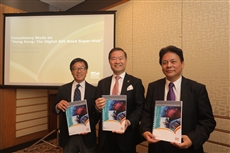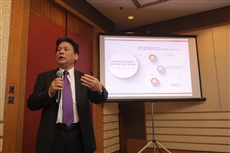Hong Kong can be ‘super-connector’ for Digital Silk Road
4 October 2019 – The current wave of digital transformation is set to bring fundamental changes to society. China’s vision to launch the Digital Silk Road Initiative as part of the broader Belt and Road Initiative aims to establish a digital ecosystem that can promote connection, inclusion, disintermediation and co-sharing in different countries along the Belt and Road. The Digital Silk Road is set to reduce trade frictions and increase efficiency, contributing significantly to the inclusive growth of the global economy.
With its inherent strengths and positioning, Hong Kong can participate in and contribute to this important initiative to build a digital economy for the world, a consultancy study supported by the Hong Kong Trade Development Council (HKTDC) Belt and Road Committee has revealed. The study was conducted by a project team drawn from three organisations: the University Research Facility in Big Data Analytics, the AMTD FinTech Centre of the Faculty of Business at Hong Kong Polytechnic University (PolyU), and the Laboratory for Smart City and Spatial Big Data Analytics at PolyU.
Hong Kong’s super-connector role
Commenting on the survey findings at a press briefing today, Dr Lee George Lam, Convenor of the Digital Silk Road Working Group of the HKTDC Belt and Road Committee, said: “Hong Kong is an international commercial and financial centre that has rich experience in facilitating business between Mainland China and the rest of the world. With its unparalleled advantages such as a simple and low tax regime, free trade and free capital flow, and comprehensive legal system, Hong Kong can play a ‘super-connector’ role to become the digital gateway for the Digital Silk Road Initiative.”
HKTDC Deputy Director of Research Billy Wong added that technological innovation and the digitalisation of financial activities brought about by the initiative will increase the flexibility of business activities between Belt and Road markets, lifting the cross-boundary hurdles that result from different legal and taxation systems and diverse trade and financial practices. “With its unique positioning as the gateway for the Digital Silk Road, Hong Kong is facing a once-in-a-lifetime opportunity to establish a new engine for growth that can help propel the world’s economy to a whole new level,” Mr Wong said.
Professor Wilson Tong, Director of the AMTD Fintech Centre of the Faculty of Business at PolyU, put the spotlight on Hong Kong’s strategic location in the Guangdong-Hong Kong-Macao Greater Bay Area, explaining that many of the mainland’s advanced technologies and talents are now concentrated in Shenzhen and Guangzhou. Hong Kong companies, including start-ups, can tap into the talent pool of the Greater Bay Area to advance their digital transformation and business development, Prof Tong said. Hong Kong is also in a strong position to help mainland tech companies “going out” to explore global markets.
Positioning in the Digital Silk Road
For the Digital Silk Road Initiative to succeed, the study determined that the prerequisite, first and foremost, is a robust digital infrastructure carrying cable networks, satellite navigation and communication systems, strengthened further by new technologies including 5G telecommunications, artificial intelligence and big data analytics. Other important elements include the establishment of laws, policies and trade agreements that can help to clarify the way in which data are transferred across borders. Data ownership, data privacy and intellectual property protection are other highly sensitive issues that need to be taken into consideration.
Hong Kong’s intrinsic strengths and extensive experience put the city in an advantageous position to play a key role in the success of the Digital Silk Road Initiative. The study has identified the following five areas where Hong Kong can make a significant contribution:
As a cloud data centre
Huge amounts of data are generated each day worldwide that have tremendous value if they can be organised and structured in an effective way. Hong Kong can consider creating a cloud data platform to encourage the sharing and use of data among Digital Silk Road countries. Hong Kong is in the best position to host such a platform as it has the capability to uphold the integrity of the data and information stored.
As a digital international financial centre
Hong Kong is a well-established international financial centre – the third largest in the world after New York and London. To move to a new level as a digital international financial centre, Hong Kong should fully embrace fintech developments and explore the possibility of launching an exchange to trade in digital assets along with a cryptocurrency that can support cross-border transactions.
As an arbitration centre
Given the city’s credibility as a legal centre, built on the strength of its common law and independent judiciary, Hong Kong is in a strong position to become an international arbitration centre. Digital technology is set to transform the arbitration process, bringing about new processes such as e-arbitration and online arbitration. The city needs to act fast to define best practices and create a workable environment.
As a smart entrepôt
Hong Kong has long been an important entrepôt with a well-established logistics infrastructure and world-class port facilities. Upgrading the freight-handling power and efficiency of Hong Kong’s seaport and airport to smart port facilities is required. By employing blockchain technology to empower supply chain financing and reduce the heavy documentation characteristic of the import-export trade, Hong Kong can further boost its entrepôt role, connecting with other markets in the Greater Bay Area to create a highly efficient logistics and supply chain.
As a smart economy
Hong Kong should speed up its development into a smart city, not only to help tackle urban problems but also to become a showcase for other countries along the Digital Silk Road. With its business-friendly environment and efficient administration, along with its world-class research universities, Hong Kong is in a strong position to groom, attract and retain talents domestically and globally.
References
Executive summary of the consultancy study report: https://beltandroad.hktdc.com/en/insights/hong-kong-digital-silk-road-super-hub
HKTDC Belt and Road Portal﹕https://beltandroad.hktdc.com/
HKTDC Research website: http://research.hktdc.com/
|
|
|
The Hong Kong Trade Development Council (HKTDC) held a press briefing today to highlight the findings of a consultancy study on the role Hong Kong can play in the Digital Silk Road Initiative. Pictured at the briefing are (from left) Billy Wong, HKTDC Deputy Director of Research; Dr Lee George Lam, Convenor of the Digital Silk Road Working Group of the HKTDC Belt and Road Committee; and Prof Wilson Tong, Director of the AMTD Fintech Centre of the Faculty of Business at Hong Kong Polytechnic University |
|
|
|
Dr Lee George Lam, Convenor of the Digital Silk Road Working Group of the HKTDC Belt and Road Committee, said Hong Kong can play a “super-connector” role to become the digital gateway for the Digital Silk Road Initiative |
|
|
|
HKTDC Deputy Director of Research Billy Wong said that with its unique positioning as the gateway for the Digital Silk Road, Hong Kong faces a once-in-a-life-time opportunity to establish a new engine for growth |
|
|
|
Professor Wilson Tong, Director of the AMTD Fintech Centre of the Faculty of Business at Hong Kong Polytechnic University, shared his insights on Hong Kong’s positioning in the Digital Silk Road |
Media enquiries
Please contact the HKTDC’s Communications & Public Affairs Department:
Coco Yuen Tel: (852) 2584 4145 Email: coco.hc.yuen@hktdc.org
Sam Ho Tel: (852) 2584 4569 Email: sam.sy.ho@hktdc.org
To view press releases in Chinese, please visit http://mediaroom.hktdc.com/tc
About HKTDC
The Hong Kong Trade Development Council (HKTDC) is a statutory body established in 1966 to promote, assist and develop Hong Kong's trade. With 50 offices globally, including 13 in Mainland China, the HKTDC promotes Hong Kong as a two-way global investment and business hub. The HKTDC organises international exhibitions, conferences and business missions to create business opportunities for companies, particularly small and medium-sized enterprises (SMEs), in the mainland and international markets. The HKTDC also provides up-to-date market insights and product information via trade publications, research reports and digital news channels. For more information, please visit: www.hktdc.com/aboutus.





